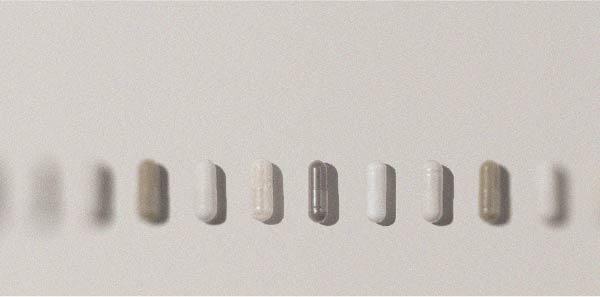The supplement (secretly) taken by doctors
According to a US study, 81% of health professionals take a multivitamin and mineral supplement. However, the sensible measures they take themselves are often ‘forgotten’ when it comes to giving advice to their patients...

According to a US study, 81% of health professionals take a multivitamin and mineral supplement. (1) However, the sensible measures they take themselves are often ‘forgotten’ when it comes to giving advice to their patients. The majority of Americans still do not take any form of dietary supplement to protect their health. They continue to fall for the messages propagated by the media that a ‘balanced’ diet will provide all the nutrients you need. As for Europeans, they remain almost stuck in the Middle Ages when it comes to nutrition. Those who take multivitamins are considered strange creatures - mild-mannered ecologists or even dangerous individuals with fanatical tendencies, who should be placed under close surveillance by the ‘Health Police’. Yet we know that modern lifestyles, pollution and increasing age (which reduces absorption of nutrients) mean that even the healthiest, most varied diet does not guarantee an optimal intake of all the vitamins, minerals, amino acids and fatty acids the body needs. In addition, we consume a lot of health-inhibiting food and ingredients such as coffee, tea, fizzy drinks, unfermented soya and alcohol, which reduce the absorption of certain nutrients. The first victims of this barrage are iron, zinc, calcium and folic acid. Vitamins are also destroyed by smoking.
Finally, there a number of drugs which impair nutrient absorption to a greater or lesser degree. Yet doctors rarely prescribe a multivitamin supplement alongside a drug to compensate for the latter’s effects. However, this does not mean that we should sit back and do nothing - that we too should ‘forget’ when it comes to taking care of our health. Many studies have demonstrated the key health benefits daily multivitamins can provide. First and foremost of course, because they help prevent a number of serious diseases (more on this below), but also because supplementation reduces subjective perception of stress, fatigue and anxiety by up to around 30% according to an important study conducted by Swansea University in the UK.(2)
Taking multivitamins therefore raises morale and improves quality of life, as well as providing protection against disease.
Major health benefits
The reluctance of health professionals to discuss the importance of vitamins with their patients is all the more difficult to understand given that it is now over ten years since vitamins were scientifically established as essential for good health.
In fact, a general analysis of every study conducted on multivitamins was published in 2002 which concluded that, as a prudent measure, all adults should take a daily multivitamin in order to prevent certain diseases such as cancer, cardiovascular disease and osteoporosis (3) (4). This is also the opinion of the world’s leading nutrition specialist, Dr Walter Willett, Director of the Department of Nutrition at Harvard University’s School for Public Health. Dr Willett goes even further, maintaining that the famous “food pyramid should, for optimal health, ideally include a daily multivitamin.”(5)
Particularly the elderly, pregnant women and children
Of course, certain people are more vulnerable than others.
These include elderly people who are most in need of multivitamins mainly because of inadequate diets : poor appetite, difficulty chewing, living alone etc, as well as poor absorption of nutrients.(6) It also includes pregnant women for whom gynaecologists routinely prescribe folic acid supplements (vitamin B9), known to reduce the risk of neural tube defects.
But prenatal consumption of multivitamins (which generally a contain a minimum of 400 µg of folic acid) could also prevent other fetal abnormalities. Furthermore, a meta-analysis in 2007 of seven epidemiological studies concluded that taking multivitamins during pregnancy is associated with a lower risk in children of tumors of the brain and the sympathetic nervous system (neuroblastoma) and of leukemia.(8) Giving multivitamins to children during their early years could lower their risk of allergy at school age and improve their IQ, according to an epidemiological study involving 2423 American children.
Many studies confirm the benefits of multivitamins in protecting against serious disease
Medical authorities in the West have established Recommended Daily Amounts (RDAs) which act as a guide to nutrition and health. However, the criteria used to set these amounts is highly questionable, since they are generally defined as the amount needed to prevent the development of deficiency-related diseases, for example, scabies in the case of vitamin C, anemia for iron and rickets for vitamin D. In reality, taking multivitamins is not about preventing diseases of deficiency but about optimising health, particularly in terms of minimising risk of serious disease. For example, the large-scale, double-blind, placebo-controlled French study SUVIMAX, which ran for over 7 years and involved 12,741 subjects aged between 35 and 60, showed that taking multivitamins at nutritional doses could lower cancer incidence in men.(10) And SUVIMAX actually used very low doses of just a few vitamins, way below optimal doses!
Taking a multivitamin supplement could in the long-term translate into a 40% lower risk of heart attack. This was the finding of a Swedish study which, over a period of approximately 10 years, investigated around 34,000 women aged 49 and over.(11)
Meanwhile, in a clinical study conducted in China, 2,141 participants aged between 45 and 74 took either a placebo, or two multivitamin capsules and 15mg of beta-carotene, every day for 5 years. In those aged 65-74 who took the supplements, there was a clear reduction in cataract incidence compared with the placebo group.(12) There is thus no doubt that multivitamins should feature at the very heart of preventive medicine, to provide protection against serious disease in children and adults as well as in the elderly. The silence maintained by health authorities in this regard therefore places serious doubt on their objectivity and independence vis-à-vis the big pharmaceutical companies, which in contrast, stand to gain from the majority of people ‘forgetting’ about this essential aid to disease prevention.
Which is the best multivitamin?
In 2012, the website lanutrition.fr published a comparison, evaluated by a panel of five independent experts, of 35 of the best-selling or most widely-taken dietary supplements on the market that combine vitamins and minerals.(13) Second and third places were awarded to NuVitamin and NuPower from Nutriting. The gold medal was given to Daily 3® from SuperSmart. This came as no surprise since Daily 3® is in a different class in terms of the quality of its ingredients, nutritional richness and value-for-money. It contains no less than 39 nutrients, including, of course, vitamins A, B, C, D, E and K at optimal physiological doses based on the latest medical literature. However, also noteworthy is the inclusion of the advanced form of vitamin B9 (folic acid), the mix of tocopherols, the presence of tocotrienols (an important form of vitamin E but one which is quietly and routinely left out by other manufacturers due to its high cost …), the substantial amount of vitamin C, and above all, the extraordinary level of vitamin D3 (1000IU per 3 capsule dose), unavailable anywhere else.
However the benefits offered by Daily 3® do not, by any means, stop there. There is the inclusion of several patented ingredients (OptiBerry® for the eyes, Biopérine® to enhance absorption of the other nutrients), resveratrol (the super-antioxidant), and lutein and zeaxanthin (which protect against age-related macular degeneration and cataract). Daily 3® also contains extracts of green tea, pomegranate and olive leaf, as well as biotin, molybdene, boron and selenium, amongst others, making it the ‘Rolls Royce’ of multivitamins. But there’s even more …
Daily 3® - the ‘pièce de resistance’
If Daily 3® is already the Rolls-Royce of multivitamins, its ‘pièce de resistance’ - the extra element that distinguishes it from all the others, is the inclusion of PQQ (pyrroloquinoline quinone). PQQ is the first anti-aging nutritional supplement to generate new mitochondria and thus ensure the longevity of all our cells. It is absolutely exceptional to find as sophisticated an ingredient as PQQ in a multivitamin supplement. Remember that mitochondria are the cells’ powerhouses - they enable cells to function at full capacity. A young person’s cells contain a great many mitochondria but as we age, levels of mitochondria decrease and those that remain become less effective and produce more waste products. The result is a massive loss of energy, which is implicated in the majority of age-related degenerative diseases: physical and cognitive problems, accelerated cell breakdown, cardiovascular problems….
Several of the ingredients in Daily 3®, such as resveratrol, improve the function of existing mitochondria. But PQQ activates the genes which control the reproduction, protection and repair of mitochondria: it constitutes an exceptional advance. PQQ is a powerful antioxidant weapon, far superior to classic antioxidants in terms of its ability to protect mitochondrial DNA. In effecting large scale electron transfers, it neutralizes the main free radicals which impair healthy mitochondrial function, without sustaining any molecular breakdown. PQQ is therefore extremely effective at combatting age-related degenerative diseases and decreases in energy in the body’s two most important organs – the heart and brain.
But its benefits extend even beyond this: PQQ is remarkably effective at protecting brain cells against oxidative damage and neurotoxicity induced by mercury and other toxins. It improves performance in memory tests and interacts positively with the brain’s neurotransmitter systems. Certain studies have shown that it prevents the development of a protein linked to Parkinson’s disease and also protects nerve cells from oxidative damage by beta-amyloid protein, associated with Alzheimer’s disease. A recent double-blind, placebo-controlled study showed that a daily dose of 10-20mg of PQQ significantly improved short term memory as well as concentration in young adults, compared with a control group.
Daily 3®: guaranteed peace of mind
Many of the multivitamins available today contain iron and/or copper and have considerable pro-oxidant effects and are thus harmful for those who are not actually vitamin-deficient.
Daily 3® is not guilty of this, containing neither iron nor copper; it is a multi-vitamin that only provides benefits. It is a product recommended for adults - they should take 3 capsules a day, one with each meal.
References
- Gardiner P, Woods C, Kemper KJ. Dietary supplement use among health care professionals enrolled in an online curriculum on herbs and dietary supplements, BMC Complementary and Alternative Medicine, 12 juin 2006.
- Kim HJ, Giovannucci E, Rosner B, Willett WC, Cho E. Longitudinal and secular trends in dietary supplement use: Nurses' Health Study and Health Professionals Follow-Up Study, 1986-2006. J Acad Nutr Diet. 2014 Mar;114(3):436-43. doi: 10.1016/j.jand.2013.07.039. Epub 2013 Oct 9.
- Sara-Jayne Long, David Benton. Effects of Vitamin and Mineral Supplementation on Stress, Mild Psychiatric Symptoms, and Mood in Nonclinical Samples: A Meta-Analysis. Psychosom Med PSY.0b013e31827d5fbd; published ahead of print January 29, 2013, doi:10.1097/PSY.0b013e31827d5fbd
- Fletcher RH, Fairfield KM. Vitamins for chronic disease prevention in adults: clinical applications.JAMA. 2002 Jun 19;287(23):3127-9.
- Willett WC, Stampfer MJ. Clinical practice. What vitamins should I be taking, doctor?.N Engl J Med. 2001 Dec 20;345(25):1819-24.
- Johnson KA, Bernard MA, Funderburg K. Vitamin nutrition in older adults. Clin Geriatr Med. 2002 Nov;18(4):773-99. Review.
- Prenatal multivitamin supplementation and rates of congenital anomalies: a meta-analysis. Goh YI, Bollano E, et al. J Obstet Gynaecol Can. 2006 Aug;28(8):680-9. Review.
- Prenatal multivitamin supplementation and rates of pediatric cancers: a meta-analysis. Goh YI, Bollano E, et al. Clin Pharmacol Ther. 2007 May;81(5):685-91. Review.
- Use of multivitamin supplements in relation to allergic disease in 8-y-old children. Marmsjö K, Rosenlund H, et al. Am J Clin Nutr. 2009 Oct 28.
Keywords
2 Days
great products and prices
great products and prices
Marie
7 Days
Easy to navigate site
Easy to navigate site, had what I was searching for, good price. easy order-check out
James Tucker
14 Days
My skin is clearing up nicely!
Pretty good for my skin so far.
Christian
16 Days
The new packaging is excellent
The new packaging is excellent - finally! No more squashed boxes and torn envelopes.
GORAN
17 Days
Great Product
Great Product
Larry Garrett
21 Days
Quick shipping
Quick shipping; good price. No issues!
Mary McCarty
22 Days
Thr product is very good and is helping…
Thr product is very good and is helping me on my health. Then is always on time
LUGO Luz
25 Days
Buying was fine
Buying was fine. I had problems with the website not recognizing my login info, and had to call to get it fixed. Other than that, everything was good.
David S. Clark
25 Days
Your super maca and super ginseng are…phenomenal
Your super maca and super ginseng are phenomenal supplements that compliment each other when taking them together. Fantastic feeling of well-being and lots of mid day energy without the crash.
Keith Mason
28 Days
I have had amazing results with every…
I have had amazing results with every supplement I've purchased. I am extremely satisfied with this company
kirstin Torres
28 Days
Fine products
Fine products . They are on the leading edge of online supplements. The only issue -so far-is they sometime run out of subscription items.
Jason Argos
31 Days
The ordering process is very user…
The ordering process is very user friendly and the products always come in a timely manner.
CARTER Rhonda
32 Days
The price for Dr
The price for Dr. Pero's AC-11 is reasonable and in line with his views. (my former colleague). Keep it pure.
CAMPBELL Clayton
35 Days
Right on every time.
Right on every time.
Arthur Nicholas
37 Days
They are cheaper than everyone else and…
They are cheaper than everyone else and the shipping was fast. Great company.
Patricia Adams




